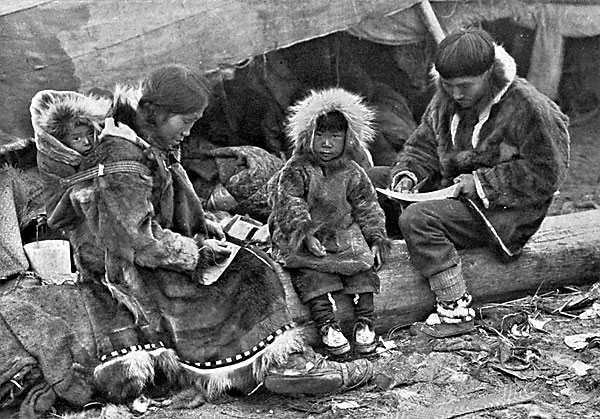The very important diversity of tribes with their own language and custom, forces me to generalize and take the most common. This article will not accurately reflect Inuit customs, which are too numerous, but will provide a global vision of their food culture.

fr.wikipedia.org

fr.wikipedia.org
Executive Summary
I- Presentation of the people
1. Who are they? Who are they?
2. Their eating habits
3. Hunting and conservation techniques
II- Food specificity
1. Food and meals
2. Food culture
3. Revenues
III- The impact on health of this type of diet
1. The positive aspects
2. The negative aspects
3. The advice we can provide
Conclusion
Bibliography
I- Presentation of the people
1. Who are they? Who are they?
Before I expand on the subject of Inuit food, I will first introduce you to this people
Inuit are a group of Aboriginal peoples who share cultural similarities and a common ethnic origin.
1) A mother and her baby in the kitchen

fr.wikipedia.org
Indeed, the Inuit were a nomadic hunting people, the origin of this people is from Eastern Siberia, in present-day Russia.
About 8 to 6000 years ago, groups of nomadic hunters crossed the Bering Strait and continued their journey along the northern coasts of present-day Canada to Greenland.
2) Inuit Migration Flows

www.museedelhistoire.ca
These individuals did not move without reason, they were simply following in the footsteps of marine mammals, caribou and also muskoxen. Only caloric sources present at these latitudes.
They live mainly in the Arctic regions of North America and Greenland, but also in eastern Siberia. There are currently about 150,000 Inuit in the various tribes. The most important tribes are the Eskimos (this term is pejorative for Inuit populations) with Nunavik and Nunavut in northern Canada, there are also the Kalaallit in Greenland, and the Yupiks in Alaska and Siberia. (Map below)
3) Distribution of the different tribes

fr.wikipedia.org
2. Their eating habits
On average, 97% of the Inuit diet is made up of animal products and the remainder of plant products during the summer. The caloric intake is distributed on average as follows: with 30 to 40% in the form of protein, 50 to 75% fat and the rest in the form of carbohydrates. Almost all carbohydrates come from animal muscle glycogen, and a very small part from berries in summer. Their living environment obviously prevents all types of cultures.
3. Hunting and conservation techniques
For animals such as seals and whales, although they live in the water, Inuit call this hunting. This is due to the fact that they use mainly the harpoon. To catch a seal, the technique is to find a hole in the ice, wait for the animal to come to the surface to breathe and then harpoon it. More recently with the arrival of snowmobiles and guns, it has become easier to hunt seals when the animal is resting. For the hunting of birds they made slingshots. As for bear hunting, it was useful to them to have warm and thick skins, to make clothes and tents. To ensure a regular food supply, the Inuit hunt only as necessary and limit it to preserve the abundance of animals and thus avoid famine.
4) Ancestral hunting technique
Ca mange quoi un Inuit ? L'alimentation des populations septentrionales est forcément très particulière vous vous en doutez, du fait de leur climat bien sûr, et donc de la faune et de la flore qui y sont très différentes de nos latitudes. Mais que peut-on...

projet-arctique.over-blog.com
5) Modern seal hunter

fr.wikipedia.org
Conservation methods are at the very least unconventional for any other population living further south. Indeed, drying for edible skins, fermentation for fats and meat pheasant farming were and are frequently used conservation techniques.
Opposite, a modern dwelling, of a settled family from Greenland. We can observe many pieces of meat drying in the open air.
II) Food specificity
1. Power supply
Their traditional cuisine is mainly composed of raw foods from fish, marine and terrestrial mammals. However, you can cook broth and caribou meat or polar bear meat (especially given to dogs), seal meat from which they ate everything, such as blood, brains, eyes, etc. Depending on what the environment has to offer (ice floes, tundra, etc.).
The most frequently caught fish species are Arctic char, trout and salmon.
Marine mammals, eaten frequently, are the most common species of marine mammals. Translated with
www.DeepL.com/Translator (free version)












